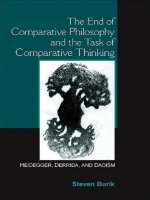edinburgh university press the idea of continental philosophy jun 2006
Bạn đang xem bản rút gọn của tài liệu. Xem và tải ngay bản đầy đủ của tài liệu tại đây (1.73 MB, 151 trang )
The Idea of
Continental Philosophy
A PHILOSOPHICAL CHRONICLE
For Jennie
THE IDEA OF
CONTINENTAL PHILOSOPHY
A PHILOSOPHICAL CHRONICLE
2
Simon Glendinning
Edinburgh University Press
© Simon Glendinning, 2006
Edinburgh University Press Ltd
22 George Square, Edinburgh
Typeset in Sabon
by Servis Filmsetting Ltd, Manchester, and
printed and bound in Great Britain by
MPG Books Ltd, Bodmin, Cornwall
A CIP record for this book is available from the British Library
ISBN-10 0 7486 2470 8 (hardback)
ISBN-13 978 0 7486 2470 6
ISBN-10 0 7486 2471 6 (paperback)
ISBN-13 978 0 7486 2471 3
The right of Simon Glendinning
to be identified as author of this work
has been asserted in accordance with
the Copyright, Designs and Patents Act 1988.
Contents
1 Starting Points 1
2 A Meeting of (Some) Minds: Phenomenology at Large 21
3 The Usual Suspects 38
4 The Analytic Perspective on the Idea 69
5 The Continental Perspective on the Idea 91
6 The (B)end of the Idea 115
Appendix: Continental Philosophy in Britain since 1986 128
Index 139
v
Starting Points
An Initiation into Philosophy
I must have been about seventeen. From the hallway I could hear two
of my older brothers talking very enthusiastically about things they
were beginning to explore in their studies at university. They were
talking about something called ‘semiotics’. The door to the room was
open as usual and I moved closer, cautiously approaching my spirited
brothers inside. At the doorway I asked for an explanation, but what-
ever I was given just hung in the air and left me out of the charmed
circle of my brothers’ talk. I had no idea what they were on about and
couldn’t get into the conversation about French literary theory that
they were then getting into.
About four years later something of all this must have been lurking
still in the delight I felt on stumbling over John Locke’s identification,
on the very last page of my edition of the Essay, of ‘
Shmeiwtikh
/’ as
one of the three most basic sorts of human inquiry.
1
I was delighted
above all that I would now be able to recall for others (it has taken me
a long time to get round to this) that a serious engagement with a ‘doc-
trine of signs’ under that title wasn’t the special preserve of recent
French thought.
That delightful discovery would come later in my time as a philoso-
phy student, but my initial forays into this kind of talk at university left
me more or less where I had been as a teenager: stationed firmly at the
(I assumed open) doorway. In fact, the number of shiny words and closed
conversations only grew, and their enigmatic obscurity became ever
more exhausting. Third-year and graduate students were now talking
about ‘postmodernism’, ‘poststructuralism’, ‘critical theory’ and ‘decon-
struction’, as well as ‘semiotics’. And philosophical figures that remained
largely invisible in an academic degree programme centred on the ana-
lytic tradition were also looming into some kind of hazy view: ‘Hegel’,
‘Kierkegaard’, ‘Nietzsche’, ‘Marx’, ‘Heidegger’, ‘Adorno’, ‘Barthes’,
‘Derrida’, ‘Deleuze and Guatari’, ‘Irigaray’ . . . I started to engage in a
1
serious effort to get my head round the basics of what was being called
‘Continental philosophy’. I wanted to come to terms with this distinc-
tive and alternative philosophical tradition.
And yet that effort only served to heighten my confusion. There
simply didn’t seem to be a philosophical mast to pin one’s colours to
round here – not one at any rate. Over the next six years or so I con-
tinued to read work by some of the big names of so-called Continental
philosophy. But despite many hours of often extremely profitable
reading I wasn’t getting any closer to seeing how they might be grouped
together. It’s not that these supposedly Continental philosophers
seemed to belong with the analytic philosophers I had come to know
in my university studies. Most clearly did not belong with them. But
they didn’t seem to hang together either. The more I read the less sense
I could make of the idea that there was a distinctive tradition of phil-
osophy in view here at all.
In 1996, shortly after getting my first full-time job as a philosophy
lecturer, I was invited by a commissioning editor from Edinburgh
University Press to put together an encyclopedia on Continental phil-
osophy. At last, I thought, I had a real chance of getting the frustrat-
ing restlessness I had been experiencing hitherto over with. As Editor
I would have to write an Introduction in which I could (would have
to) finally sort out a view of my own, ‘my view’, on what Continental
philosophy is . . .
This book is an elaboration and development of that Editor’s
Introduction.
2
And in this new text, as in the earlier one, I will defend
a view that ploughs a relentlessly sceptical furrow with respect to the
idea of a distinctive Continental tradition in modern philosophy. The
opening sentences of the earlier Introduction prepared the reader for
my doubts. I see now that they also generalise the initiation anxieties
that I have just related:
Most people familiar with contemporary philosophy, particularly philoso-
phy as it is taught at universities in the English-speaking world, will also be
familiar with the category of ‘Continental philosophy’. However, such famil-
iarity typically extends no further than being able to say whether or not a
given author is typically called a ‘Continental philosopher’. Situations of this
type normally reflect the shortcomings of a beginner or non-specialist, but
in this case it seems to be more like a normal feature of the use of this label.
Indeed, as I hope to show in this introduction, as a term of classification, the
category of ‘Continental philosophy’ somewhat lives on being vague and
free-floating.
3
The Idea of Continental Philosophy
2
You can imagine that I was not entirely confident that my own
account wouldn’t just ‘reflect the shortcomings of a beginner or non-
specialist’. And so you can imagine too how relieved I was to find
that, in fact, I was not alone in finding the idea of a distinctive
Continental tradition so problematic. At the same time as I was
writing my Introduction, one of the leading British authorities on
phenomenology and deconstruction, Simon Critchley, was writing
one too for the same sort of publication – and was (totally independ-
ently) coming to a (broadly) similar conclusion.
4
What gets included
in Continental philosophy comprises, he suggested in his Introduc-
tion, ‘a highly eclectic and disparate series of intellectual currents
that could hardly be said to amount to a unified tradition’,
5
and
more strongly still he concluded that ‘there is simply no category
that would begin to cover the diversity of work produced by
thinkers as methodologically and thematically opposed as Hegel and
Kierkegaard, Freud and Buber, Heidegger and Adorno, or Lacan and
Deleuze’.
6
Yes, yes.
Both Critchley and I identified a darker side to this odd story too. It
also struck us both as deeply significant that the title of ‘Continental
philosophy’ did not initially arise as a result of self-designation, but
from a form of other-designation that Critchley called ‘projection’ and
I called ‘exclusion’. Here is Critchley with the basic point:
Continental philosophy is an invention, or more accurately, a projection of
the Anglo-American academy onto a Continental Europe that would not
recognise the legitimacy of such an appellation – a little like asking for a
Continental breakfast in Paris.
7
The hunt for the inside track on Continental philosophy was over:
there is no inside track to be found. Or at least that is what I had sup-
posed and still suppose. As we shall see later in this book, Critchley
thought otherwise and went on to affirm a positive, non-projective
sense of a Continental tradition in philosophy. Since reading his
‘Introduction’ and later his book Continental Philosophy: A Very
Short Introduction – a book which is, like this, an ‘expanded’ version
of the earlier essay
8
– my ideas on the idea of Continental philosophy
have developed with his in full view. However, although we are for long
stretches fellow travellers, we are at crucial points quite sharply at
odds. In particular, I remain convinced that his attempt to identify
internal glue for a Continental tradition is doomed from the start. And
not just doomed for him but for anyone: there is none.
3
Starting Points
It can sometimes seem hard to believe that this could be an even
remotely plausible conclusion. My own upbringing in philosophy took
place in a culture powerfully informed by the idea that the differences
within in it should be comprehended in terms of the division between
analytic and Continental philosophy. So the suggestion that the cat-
egory of Continental philosophy is fundamentally ill-formed and prob-
lematic can seem hopelessly naive and scholastic. Yet I have gradually
come to believe that, for the most part, recourse and reference to this
division functions in a way that is more polemical and opportunistic
than it is considered and well-founded. Even in contexts where no
obvious judgement is being made about the quality of work being
placed on either side, most appeals to the idea of a division or distinc-
tion between analytic and Continental philosophy seem to me at best
troubling, and at worst simply awful.
This book aims to reconfigure our sense of the differences that
inform our philosophical culture and tries to understand why those dif-
ferences have been comprehended – and indeed lived – in terms which
seem to me to be profoundly distorting and inadequate. In this chapter
I will lay out three interpretive proposals which will guide my discus-
sion throughout this book. I hope what I will say later on will reduce
the dogmatic appearance of the proposals as they are introduced here.
However, I want to be able to get going from what I consider to be the
right starting points, and that requires getting ahead of the argument
a little. Uncritical appeals to the schema ‘analytic or Continental’
betoken for me a failure to be alive to its (conceptual, existential, insti-
tutional) functioning and significance. I think we can do better than
that and I want to try to do so from the start.
Interpreting Philosophy Today
Perhaps I shouldn’t get so hung up about the problems with the div-
ision. It is not as if I don’t know that there really are significant differ-
ences in the vicinity, differences which are often sufficient to ruin every
effort to engage in positive discussion, let alone a critical dispute.
I know things are bad, sometimes really bad. But – and here is my first
interpretive proposal – in my view appeals to the idea of division belong
to what is so rotten here. That is, in a situation where communication
between different parts of our philosophical culture has all but broken
down, the thinking about the breakdown that is an appeal to the idea
of a division between analytic and Continental philosophy does not so
The Idea of Continental Philosophy
4
much as capture the scene as it is part of it. It is itself a form of philo-
sophical failure, a dimension of our inhabitation of the economy of our
philosophical culture that is in so much of a hurry to say plainly ‘what
is what’ that it is insensitive to the fundamentally questionable charac-
ter of its own terms of trade.
So for some time now I have been trying to get to know what is
going on here in a more measured way. And I keep concluding that a
great many people who appeal to the division don’t know what they
are doing, don’t know what they are talking about, don’t know or
don’t want to know how the distinction is functioning in their dis-
course. It really is a fault in our culture.
Wanting to make things better the British philosophical logician
Michael Dummett has said recently that it is only by going back to a
point before the division occurred that we can hope to ‘re-establish
communication’, that ‘it is no use now shouting across the gulf’.
9
I
want to make things better too, and one of the reasons I think I can is
that unlike many of my contemporaries I move around some of the
supposedly gulf-separated texts in the stream of contemporary Western
philosophy in ways which do not conform to this gulf-stricken image.
I’m not saying, not pretending, that everything which finds a place in
my life with philosophy is ‘really the same’ or that no one within me is
shouting at anyone or failing to hear someone. Nor am I saying some-
thing of the kind that Dummett himself expressed when he found, to
his surprise, that two seminal thinkers writing at the turn of the nine-
teenth century, Frege and Husserl, thinkers who he had supposed
(because of the going terms of trade) should have been miles apart,
were, in him, for him, not ‘deeply opposed thinkers’ but ‘remarkably
close in orientation despite some divergence of interests’.
10
I’ve also
had that kind of experience, and it is an important one. But I don’t
want to ignore the other kind of experience, the experience of finding
two writers who are supposed to be involved in the same subject speak-
ing from radically different positions, positions which are not merely
differences within (a given understanding of) philosophy but differ-
ences which attest to a conflict over what philosophy itself is or can be;
differences over what can count as a philosophical remark or as a con-
vincing appeal to people’s attention; differences over what can be
regarded as a responsible way of going on in philosophy. I have had
that kind of experience too.
Nevertheless, I want my thinking about the situation here to be
more cautious and more refined than one generally finds. As I see it,
5
Starting Points
for the most part people seem happier to render inaccessible to them-
selves whatever they are (for some reason) interested in underestimat-
ing. And that, I think, is one of the main functions of the idea of an
analytic/Continental split. It rationalises a willingness not to read, at
least a willingness not to render oneself capable of reading well.
Of course one can’t read everything, let alone read everything well.
And I know too that philosophical writings that do not belong to the
mainstream of analytic philosophy will typically be experienced as dis-
tinctively difficult to read by people whose studies are centred on that
mainstream. However (and fully accepting that), there are two related
interpretive responses to that distinctive difficulty that I want funda-
mentally to challenge:
1. the response that rationalises that difficulty by identifying such work
as belonging to a distinctive Continental tradition of philosophy;
2. the response that sweeps the problem away by affirming that work
in the Continental tradition does not typically represent the most
responsible way of going on in philosophy.
The second, profoundly evaluative response is not something I could
hope directly to challenge in this book. Not even an engagement with
textual details could rebut that kind of charge. Since what counts as a
responsible way of going on in philosophy is not something one can
establish independently of having a high regard for a given way or ways
of going on in philosophy, one would be looking to turn people round
in their conception of the subject to an extent which no introduction is
likely to achieve. However, I will want to confront the first interpretive
response head on. And my hope is that this confrontation will not leave
the second in such good shape. Again, I want to stress that the fact that
I want to challenge the first of these responses should not be taken to
suggest that I think that the kinds of works of philosophy that get iden-
tified in this way are really not so very different to works of analytic
philosophy. As Dummett came to see some are not so very different, and
that is important for everyone to realise since it shows that the differ-
ences are not always so sharp as is sometimes supposed. But that is not
the basis of my objection to the response. The point is that even if I
accept (as I do) that, in some more or less obvious and unexceptional
sense, none of the writings identified as ‘Continental’ should be thought
of as works from the tradition of analytic philosophy, I am under no
obligation to accept the stronger response that they are works from a
distinctively different Continental (or Modern European or whatever
The Idea of Continental Philosophy
6
other name one wants to give it) tradition of philosophy. And here I
want to enter a proposal – my second and most basic interpretive pro-
posal – that provides a very strong reason for thinking that the current
idea of division belongs to the scene of breakdown it aims to describe.
The basic reason for thinking the current idea of division belongs to the
rotten scene it aims to describe is that there is no such thing as the trad-
ition of Continental philosophy.
That sounds very exciting. And in all the excitement it can lead to
misunderstandings too. Since I want to call into question the very idea
of Continental philosophy in this way it is very difficult for me to avoid
giving the impression that something significant and perhaps rather
obvious about the present philosophical culture is being overlooked or
denied by my approach. An example of this effect will help illustrate
some of the other things I have been touching on to this point. In a
recent review of a book which collected interviews with a number of
the younger generation of British philosophers, the philosopher of
science Donald Gillies wrote of his surprise to see what he called ‘a def-
inite shift among new British philosophers away from the traditionally
British analytic philosophy and towards Continental philosophy’.
11
Here we see the idea of the division within the contemporary philo-
sophical culture between a traditionally British (or Anglophone) ‘ana-
lytic’ mode and a contrasting ‘Continental’ one appealed to in the way
we might call operational rather than thematic: the idea of a difference
is not the object of philosophical investigation so much as the matter
of course resource for (meta)philosophising. Now, I am not certain
that the same confidence in the distinction was really on show in all
of the interviews in that book, but it is clear that Gillies did not think
my thoughts on the matter had much going for them, and he wanted
to see me as rather isolated in wanting to challenge the stereotypes in
this area:
One philosopher Simon Glendinning in his interview in chapter 12 puts
forward the view that the difference between analytic and Continental phil-
osophy is not an important one. As he says (p. 204): ‘. . . the analytic and
Continental distinction . . . ultimately lacks any deep philosophical signifi-
cance.’ However, this view is not shared by any of the other philosophers
who discuss the matter, and who assume there is a very significant differ-
ence between the two approaches to philosophy.
I am ruefully sure that I did not do myself many favours with that
remark in the interview. At least that’s how I feel now when I see it
7
Starting Points
extracted from a context where I was trying positively to identify the
philosophical issues which most deeply divide philosophers in our time,
issues which I conceive as circulating around the relationship of philo-
sophy to science and which I was sure then as now cannot be held within
the frame of the analytic/Continental difference. In any case, the burden
of my argument was not at all to suggest that the analytic/Continental
difference ‘is not an important one’ as Gillies puts it for me (do the words
he cites really support that strong construal?), but rather to identify or
specify the kind of importance, the kind of philosophical significance, it
has. Indeed, in my defence I might note that I explicitly stressed that my
approach ‘does not mean that the account of the growth of the distinc-
tion and division, the developing idea of a wide gulf, has no philosoph-
ical significance’.
12
The division belongs centrally to the understanding
of Western philosophy as it goes on today, and one cannot move without
bumping into it – as ‘the other philosophers who discuss the matter’ in
the interviews also significantly show. Since I think that the very idea of
a distinctive Continental tradition – a way of going on in philosophy
with its own distinctive style, method or problematic field – is deeply
questionable I can hardly accept that the analytic/Continental distinc-
tion is, as such, of ‘deep philosophical significance’. That it touches all
of us (all the time and sometimes deeply), however, is simply beyond
question, and I have never suggested otherwise.
Still, I have clearly given the impression that I wanted to ignore
something important about the present situation. And it is worth
reminding ourselves of the force of a distinction which still dominates
(and for some has really messed up) the lives of philosophers in our
time. While insisting that the differences ‘between so-called Continental
and Anglo-Saxon philosophies’ cannot be understood in terms of
intraphilosophical ‘questions of style, method or even problematic
field’, Jacques Derrida, writing back in 1978, summarised well a situ-
ation in which,
[differences] are sometimes so serious that the minimal conditions for com-
munication and co-operation are lacking. The minimal contract of a
common code is no longer ensured, and when I speak of a code I do not
mean only the strictly linguistic element of these rules of exchange. Within
a single linguistic area, for example, the Anglophone world of Britain and
America, the same interference or opacity can prevent philosophical com-
munication and even make one doubt the unity of the philosophical, of the
concept or project behind the word philosophy, which then constantly risks
being but a homonymic lure.
13
The Idea of Continental Philosophy
8
For Derrida – and I think he is right about this – the breakdown
‘between so-called [note that careful attention to a questionable name]
Continental and Anglo-Saxon philosophies’ can ‘sometimes [note that
equally scrupulous attention to the variability of the difficulty]’ suffice
to make the idea of philosophy itself, the idea of a distinctive form of
inquiry, a specific mode of questioning among others, seem ‘precarious
and enigmatic’.
14
We are quite close (and in view of the attention to
details, also quite far) with this worry to the British moral philosopher
R. M. Hare’s view, stated some twenty years earlier, and to which I will
return later in this book, that philosophy as it stands in our time is not
(or is no longer) one: there are, he boldly claimed in 1960, ‘two differ-
ent ways’ in which philosophy is now studied, ways concerning which
‘one might be forgiven for thinking . . . are really two quite different
subjects’.
15
As Dummett put it more recently ‘we have reached a point
at which it is as if we’re working in different subjects’.
16
If only there really were now two subjects, if only it were now such
that it was more than only ‘as if’ it were so, if only the title really was
now nothing but ‘a homonymic lure’ masking the fact that the con-
temporary inheritance of the subject that used to be called philosophy
had bifurcated into two different subjects . . . If only all that were true
then everything would be so much simpler. The differences would be
tractable, traceable to identifiable differences of style, method or prob-
lematic field of the two subjects. But it is not. And that non-simplicity,
for me, is quite enough to demand of us something better, something
more refined than a machine-like reiteration of the assumption that
what is at issue ‘is a very significant difference between the two
approaches to philosophy’. That the situation is one in which the philo-
sophical culture is at times deeply divided, divided in ways which are
‘sometimes so serious’ as to make communication nearly impossible,
is, as I say, beyond question. But precisely because of the ‘precarious
and enigmatic’ condition of philosophy today, a serious engagement
with the nature and significance of that all too secure and clear idea of
division is, it seems to me, a timely one. In any case that is what I am
going to attempt in this book.
A measure of the distinction’s power and cultural reach today was
brought home to me recently when I was getting ready to leave a party.
I was just putting my jacket on to go home when someone said to me
‘Ah, now you look the complete Continental philosopher’.
17
The per-
tinence of the friendly remark (and the reason it took putting a black
leather jacket on to look the part) would not be lost on anyone who is
9
Starting Points
at all familiar with contemporary images of Continental intellectuals.
The distinction between that (supposedly) rather exotic breed of
engagé thinkers and their (supposedly) less glamorous and sedentary
Anglo-Saxon or Anglo-American or Anglophone analytic version is
very precisely recorded by Simon Critchley, someone who (I think)
knows very well what one should wear when:
One is used to thinking of the distinction between the analytic and Contin-
ental traditions [in terms] where analytic philosophy is conservative and
stuffy in a sort of senior common room, leather arm-patch sort of way, and
Continental philosophy is its funky streetwise, leather-jacketed obverse.
18
The idea of being (or at least appearing to be) something of a radical,
a roguish outsider to the dominant establishment and the mainstream,
is often considered central to the ethos of those who engage in
Continental philosophy today, and it may even be what draws some
people towards it. Those who these days take the title for themselves –
wherever they live or work – commonly see what they do as an attempt
to revitalise the discipline, offering as one subscriber in America puts
it, ‘a way out of the doldrums that philosophy has accomplished for
itself in the past several decades’.
19
So it can all seem so very vital, so
very different from the arid-seeming terrain of the analytic main-
stream. (That’s not totally wrong.)
Of course, things look rather different from the terrain of the ana-
lytic mainstream. Doldrums? What doldrums? ‘You may find our argu-
ments dry, but do you really think the barely readable, esoteric, ex
cathedra words of your Continental masters are going to revitalise any-
thing . . .’ (That’s not totally wrong either.)
And so it goes on. But with this difference of perception – a differ-
ence I can readily acknowledge myself – something becomes visible
that is of enormous significance to an understanding of the idea of an
analytic/Continental division in general: namely, that it belongs to a
bifurcation in what I want to call reception-responses. More specific-
ally, what is at issue with the idea of Continental philosophy is the
reception ‘over here’ of work that is going on ‘over there’.
In this context ‘over here’ now designates something like ‘from the
English-speaking world’. However, for reasons that are far from negli-
gible, this English-language reception context is, in fact, originally, a
British one. It is not only that the spatial designators (over here/over
there) work better from Britain (we really can point from here, it is that
close), the very title ‘Continental’ clearly signals a British source. The
The Idea of Continental Philosophy
10
English word ‘continent’ (deriving from Latin sources from which we
also get the word ‘container’) had, by the middle of the seventeenth
century, already taken on its current geographical sense of ‘a vast land-
mass not broken by seas’, but around this time, when preceded by a
definite article (and often with a capitalised initial), it was also begin-
ning to be used as the name for ‘the mainland of Europe, as distin-
guished from the British Isles’. The idea of the Continent is in itself a
designation from over here of a place which is, essentially, over there.
There is a reference to an elsewhere inscribed in the name, and this is
something that the idea of Continental philosophy imports into itself
from its British origins. The British title may now have travelled the
world, and was unquestioningly taken up by most of the American
philosophical academy some forty years ago now,
20
but there are trail-
ing clouds of British history which are not sloughed off in this passage,
and the idea of Continental philosophy is never radically free of its
taint of being that form of (broadly speaking) Western philosophy that
is not what we do round here – most of us anyway, those who have
managed not to succumb to what a Cambridge don recently called the
‘common taste for mystification’ or ‘inflated trivialities’ of many of his
colleagues in the humanities.
21
Now, saying it is not what we do round here may be regarded ‘purely
descriptively’, but there is no doubt that for the majority of philoso-
phers in the English-speaking world during the twentieth century the
idea of Continental philosophy has had a profoundly evaluative accent,
representing quite precisely what is beyond the pale philosophically
speaking – the Cambridge don’s dig is a cat coming out of the bag. It is
not only What we do not do, but What ought not be done if one wants
to think seriously within the central channels of the Western philo-
sophical tradition. On this view, the idea of Continental philosophy is
the idea of a kind of bastard offshoot of that tradition, an offshoot
which, although in a very broad sense part of the history of the subject,
is not part of the central strand. Specifically, it is an offshoot that is
marked by a kind of failure of inheritance, an abandonment of the stan-
dards which should characterise properly philosophical inquiry. Thus
authors engaged in what, at least since the time of J. S. Mill, British phil-
osophy has been calling ‘the Continental philosophy’ are regarded as
doing work which is not only of a supposedly distinctive kind but also,
it must be said, of a decidedly inferior quality.
22
During the second half of the twentieth century this view came to
dominate philosophical institutions right across the English-speaking
11
Starting Points
world. No English-speaking philosopher educated since the late 1950s
could fail to appreciate that ‘Continental philosophy’ is regarded as the
harbinger of all that is ‘arbitrary, pretentious and soul-destroying’ in
contemporary thought, wherever it is written.
23
So the idea of Continental philosophy, and the idea of participating
in a distinctive Continental tradition, does not actually emerge from
where one might have thought it should have emerged from. In fact, it
is difficult even to articulate the idea in a language other than English.
(It is notable that the Collins-Robert dictionary (1992) details the cap-
italised use of ‘Continental’ in the English/French section but not in the
French/English section.) In this respect, as we have seen Critchley point
out already, the use of the title ‘Continental philosophy’ can be com-
pared to that of a ‘Continental breakfast’. No one who lives on main-
land Europe would have thought of giving their morning meal that
name, but now there is not only a kind of breakfast called a ‘Continental
breakfast’, it is possible to eat one anywhere. In fact, it is now a truly
intercontinental phenomenon. One can ever order it, to some bemuse-
ment of the locals, on the Continent.
Some parallel points can be made about Continental philosophy. It
is not simply that, as it is understood today, it can now be ‘done’ else-
where or anywhere, but the generic sense it now has is of a style or
species of philosophy which can be done anywhere. It can be done in
America or Australia too, or, again, on the Continent.
Of course, this understanding assumes that there really is something
which has an identity sufficiently robust to be spotted, repeated and
here or there indulged in. While I am happy to concede that this is now
the case with a Continental breakfast, I am far less confident that the
same can be said for Continental philosophy. In the chapters that
follow I will argue that the very idea of a fruitfully distinguishable
philosophical tradition of Continental philosophy is, first and fore-
most, part of the mythological history of (the movement that came to
call itself) analytic philosophy. That is, and this is my third interpretive
proposal, the very idea of such a tradition is best thought of as an item
that has its original home in the conceptual armoury of analytic phil-
osophy. In this respect, ‘Continental philosophy’ is less the name for
an other kind of philosophy than analytic philosophy, but a term that
functions within analytic philosophy as the name of its own other, that
part of its lexicon which represents what is ‘not part’ of it. In what
follows I will often say that Continental philosophy is, for this reason,
‘the Other’ of analytic philosophy. The point of this capitalisation is
The Idea of Continental Philosophy
12
visually to mark a difference (which I think is actual) between modes
of philosophy that are not part of the mainstream of contemporary
analytic philosophy (they are genuinely other to analytic philosophy)
and analytic philosophy’s own conception of those modes as compris-
ing a distinctive and significantly different approach to philosophy (the
Other of analytic philosophy).
As we shall see in later chapters, analytic philosophy itself suffers
from this understanding. However, as I have already indicated, there is
a complication to this point brought about by the fact that, in recent
years, many people have appropriated the title positively to define what
they do themselves. I will delve into that recent history later, and when
I do I will show that the appropriation of this title for a vital ‘new
wave’
24
in philosophy is, as many of the advocates of the idea know
full well, essentially separable from the (I think) totally implausible
suggestion that their work relates to a distinctive Continental tradition
of philosophy.
So we have three interpretive proposals:
1. In a situation where communication has all but broken down
between self-styled analytic philosophers and other voices in the
contemporary philosophical culture, the thinking about the break-
down that is an appeal to the idea of a division between analytic
and Continental philosophy does not so much as capture the rotten
scene as it is part of it.
2. There is no such thing as the tradition of Continental philosophy
3. The idea of a distinctive Continental tradition is best thought of as
an item in the conceptual armoury of analytic philosophy; it is the
idea of its own Other.
To conclude this chapter I want briefly to clarify the second and
perhaps most radical of these proposals.
A Working Distinction: Works of and Works in
My approach to the topic of this book is iconoclastic, but I hope that
it will not be regarded as inaccurate or unrealistic, nor indeed unsym-
pathetic to those in the English-speaking world (or anywhere else for
that matter) who now (or now and then) take the title of Continental
philosophy for what they do, myself included.
In order to clarify
the historical and institutional situation as I see it I am going to make
use of a distinction between, on the one hand, writings as they are
13
Starting Points
gathered under a certain title (‘works of X’) and, on the other hand,
writings as they are committed to a certain outlook or adhere to a
certain methodological conception (‘works in X’).
25
Now, one might
expect that the sets of works identified by these specifications to be co-
extensional. So while the relations between different texts may be
complex and marked more by Wittgensteinian family resemblances
rather than by ubiquitous common features, it would seem unprob-
lematic to affirm, for example, that ‘the primary works of logical pos-
itivism’ precisely comprise those texts that are ‘the primary works in
logical positivism’. Can the same be said of analytic philosophy?
Although the family resemblances are less determinate in this case, in
a rough and ready way I think it can. Hanjo Glock provides a con-
ceptual schema which seems to me to capture things very nicely in this
area (see Figure 1.1).
26
If you tick the majority of the boxes you are an analytic philosopher,
if you do not you are not. Glock’s table gives a few illustrative exam-
ples from the movement of analytic philosophy, but it is instructive to
try it out on any of those who do not normally count as analytical
philosophers as well. And it seems to me that people who do not nor-
mally count don’t count here either.
27
Doubtless this result would
provide an opening for the idea that these authors belong to a distinc-
tively different tradition in contemporary philosophy. However, the fact
that one can produce a set in this way (a set formed by virtue of its
members sharing the property of ‘not being an analytic philosopher’)
does not mean that one has unearthed a tradition: there are an indefin-
ite number of ways of not being something. As I hope to show, coming
to appreciate (if not exactly to admire) why certain texts have been
brought together as the Continental collection helps one clearly to see
The Idea of Continental Philosophy
14
Frege Russell Vienna
Circle Quine Oxford TLP PI
Linguistic turn ✗✗ ✓✓✓✓✓
Rejection of metaphysics ✗✗ ✓✗(✓)(✓) ✓
Philosophy science (✗) ✗ (✓) ✗✓✓✓
Reductive analysis (✗) ✓✓(✓) ✗✓✗
Formal logic ✓✓ ✓✓(✗) ✓✗
Science oriented ✓✓ ✓✓✗✗✗
Argument ✓✓(✓)(✓) ✓ (✗)(✓)
Clarity ✓✓ ✓(✓) ✓✗(✗)
Figure 1.1 Analytic philosophy at a glance.
why what one can in this way call the primary works of Continental
philosophy do not comprise the primary works in it.
In order to account for the more recent idea that Continental phil-
osophy is a distinctive and vital ‘new wave’ on the contemporary phil-
osophical scene I will, in due course, need to complicate matters
somewhat and add the further category of ‘works on works of
Continental philosophy’. To complicate matters further still these works
tend to go by the name of ‘studies in Continental philosophy’. However,
my claim will be that even the most exemplary and influential of such
writings remain historically and methodologically secondary to the
major works of Continental philosophy that they engage with, and so
do not, in that sense, comprise ‘primary texts in Continental philosophy’
either. My second interpretive proposal can be helpfully reformulated
like this: there are no primary texts in Continental philosophy.
Even this refinement of my second and most blunt proposal may
seem too blunt. After all, the authors and texts which are typically
grouped together under this title, the various ‘currents of thought’
28
or
‘philosophical practices’
29
that are brought together under the single
banner, are more or less (sometimes more, sometimes less) closely
related to each other. For this reason it might be thought that my rejec-
tion of the very idea of a distinctive tradition in this case must presup-
pose an unhelpful and far too demanding understanding of what does
and what does not constitute a tradition in the first place. For example,
am I saying that a set of texts can only belong to a philosophical
tradition if they all or nearly all share certain basic principles or
assumptions? Aren’t traditions just a bit more rough-and-ready, a bit
more unprincipled than that?
In fact, as I hope should already be evident, I am completely con-
vinced that traditions are not formal unities, not fully rational struc-
tures. Hence, I do not suppose that the fact that there are clear objections
to the idea that there is a recognisable or determinate methodological
kernel or characteristic outlook shared by the primary texts of
Continental philosophy automatically discredits the idea that there is
good reason to think that what is at issue here may, indeed, be a dis-
tinctive tradition in it. No, what discredits that idea is something else,
something that most experts working in the field know full well: namely,
the fact that what gets grouped together as the primary works of
Continental philosophy ‘is a highly eclectic and disparate series of intel-
lectual currents that could hardly be said to amount to a unified trad-
ition’
30
or, again, and more pointedly that ‘there is simply no category
15
Starting Points
that would begin to cover the diversity of work produced by thinkers as
methodologically and thematically opposed as Hegel and Kierkegaard,
Freud and Buber, Heidegger and Adorno, or Lacan and Deleuze’.
31
That
is all, but if it is right it should be quite enough to ruin the suggestion of
a distinctive tradition.
So while the thinkers and movements that are usually included under
the banner do comprise, as one commentator has put it, ‘a variety of
more or less closely related currents of thought’,
32
this does not, in my
view, justify talk of a distinctive tradition. Indeed, so weak is the inter-
nal bonding in this group that analytic philosophers are often ‘more
or less closely related’ (sometimes more, sometimes less) to them too.
Thus, in my view, what these interrelations really point towards is
ultimately the profound ‘enigma’ of philosophy itself as a subject
touched on earlier. I mean, what holds them all together – analytic and
non-analytic, and all among each other – is about as far from being a
simple matter as one can get. The question ‘What is philosophy?’ is
itself a question in the subject that goes by the name ‘philosophy’. And
there is, I think, no way out of that interpretive and contested circle.
The Wittgensteinian image of family resemblances helps us to
understand how a conceptual unity can tolerate a wide diversity of
cases. However, it can also be invoked to support a certain way of
going on with the idea of the division of the contemporary culture that
I find just as misleading and unhelpful as more cut and dry views. In
ecumenical spirit someone might say ‘Of course there is no rigid div-
ision, no unbridgeable chasm between analytic and Continental phi-
losophy. There is a spectrum of cases, and they shade over in the
middle’. What is right in that spectrum image is the idea that the dif-
ferent movements or currents in the stream of Western philosophy typ-
ically shade across each other. But the mistake is to think of that stream
as amenable to a cross-section that divides it roughly into two: that
there is one (transverse) line running across the river with, as it were,
Logic at one bank and Poetry at the other, and a fuzzy overlapping bit
in the middle. The banal truth is that there are various currents in the
contemporary philosophical culture and they sweep and seep into each
other at various points and in various ways, and sometimes they are
not close at all.
33
There is no future in erasing such differences and
trying to make everyone seem the same, neither when we are looking
at differences between thinkers who are in the analytic mainstream and
thinkers who are not, nor when we are looking at differences between
the motley of thinkers who are not. In the chapters that follow I will
The Idea of Continental Philosophy
16
try to show that existing attempts to justify the idea that the primary
works of Continental philosophy comprise something like a philo-
sophical tradition that stands in a more or less clear contrast to the ana-
lytic tradition are (in various ways) inadequate. More ambitiously,
I will try to show too that these inadequacies could not be overcome
by a more powerful or more nuanced account. I will also try to indi-
cate where this leaves those working and thinking within the current
philosophical culture, steeped as it still is in the idea of a distinctive
‘Continental mode’ of pursuing philosophy.
Notes
1. John Locke, An Essay Concerning Human Understanding, ed. A. D.
Woozley, Glasgow: Collins, 1964, p. 443. The most natural modern-
English translation of ‘
Shmeiwtikh
/’ would be, of course, precisely,
‘Semiotics’.
2. Simon Glendinning, ‘Introduction’, Encyclopedia of Continental Philoso-
phy, ed. S. Glendinning, Edinburgh: EUP, 1999. A more recent version
of that Introduction is published in Fundamentals of Philosophy, ed.
J. Shand, London: Routledge, 2003.
3. Simon Glendinning, ‘Introduction’, p. 3.
4. Simon Critchley, ‘Introduction’, in A Companion to Continental
Philosophy, eds S. Critchley and W. Schroeder, Oxford: Blackwell, 1998.
5. Simon Critchley, ‘Introduction’, p. 5.
6. Simon Critchley, ‘Introduction’, p. 6.
7. Simon Critchley, ‘Introduction’, p. 5.
8. Simon Critchley, Very Short Introduction to Continental Philosophy,
Oxford: OUP, 2001, p. 137.
9. Michael Dummett, cited in Critchley, Very Short Introduction to
Continental Philosophy, p. 15.
10. Michael Dummett cited in Critchley, Very Short Introduction to
Continental Philosophy,p.15.
11. David Gillies’s review of New British Philosophy: The Interviews,
eds J. Baggini and J. Strangroom, London: Routledge, 2002, ‘Some Reflec-
tions on New British Philosophy’ is posted at />schools/hums/philosophy/frames/Staff/Gillies/newbritishphilosophy.html.
The Appendix to this book will offer considerable support for Gillies per-
ception of a shift in the cultural formation of philosophy in Britain in recent
years. Everything which precedes the Appendix will, however, call into
question his way of articulating that shift.
12. Simon Glendinning, New British Philosophy: The Interviews, p. 205.
13. Jacques Derrida, Who’s Afraid of Philosophy, Stanford, CA: Stanford
University Press, 2002, p. 104.
14. Jacques Derrida, Who’s Afraid of Philosophy, p. 104.
15. R. M. Hare ‘A School for Philosophers’, Ratio, vol. 2, no. 2, 1960, p. 107.
17
Starting Points
16. Michael Dummett, cited in Critchley, Very Short Introduction to
Continental Philosophy, p. 15. Emphasis mine.
17. Kevin O’Sullivan (personal communication).
18. Simon Critchley, Very Short Introduction to Continental Philosophy,
p. 45.
19. Hugh Silverman, Philosophy and Non-Philosophy since Merleau-Ponty,
ed. H. J. Silverman, London: Routledge, 1988, p. 2.
20. John McCumber has suggested that the term crossed the big pond
(another British expression which indicates a (different) kind of proxim-
ity of an ‘over there’) ‘in the mid 1960’s’ (John, McCumber, Time in the
Ditch, Evanston, IL: Northwestern University Press, 2001, p. 50).
21. Nicholas Denyer, ‘The Charms of Jacques Derrida’, Cambridge Review,
vol. 113, no. 2318, October 1992, p. 104.
22. Simon Critchley has identified two essays by Mill from the 1830s and
1840s which may be the first writings in print to make use of the terms
‘Continental philosophers’ and ‘the Continental philosophy’ (Simon
Critchley, Very Short Introduction to Continental Philosophy , p. 42). It
should be remembered, however, that Mill himself conceived his own
work as in crucial ways trying to overcome an antagonism between what
he called ‘English’ and ‘Continental’ thought about politics – between a
mode of political thought based fundamentally on a theory of human
nature (the outlook of his father(s) with its roots in Cicero’s attempt to
derive a – political – theory of human nature from Plato) and one based
on a view of human history (an outlook with its roots in Polybius’
attempt to derive a – political – theory of human history from Plato). Mill
retained a priority of the psychological over the historical but his own
position is strikingly ‘mixed’. This series of footnotes to Plato is brilliantly
outlined in Robert Cumming’s study of the development of liberal
thought Human Nature and History (2 vols, Chicago: Chicago University
Press, 1969). We might note for the record that Cumming regards the
result of Mill’s reconciliation as the effective transformation of political
theory into what Mill calls ‘mental history’, i.e. into the history of ideas.
Cumming calls this turn to a genre that is ‘slacker than philosophy’
(Vol. 2, p. 432) ‘a final and fatal weakening’ of traditional political phil-
osophy (Vol. 2, p. 426).
23. John Passmore, A Hundred Years of Philosophy, London: Penguin, 1957,
p. 467.
24. Hugh Silverman, Philosophy and Non-Philosophy since Merleau-Ponty,
p. 2.
25. I am indebted to conversations with Peter Osborne for showing me the
significance of this distinction, and will cite his own formulation of it in
the final chapter. The main argument of this book develops and I hope sys-
tematically accounts for Osborne’s hunch that in the case of Continental
philosophy the two dimensions come apart. I will not always advert to the
distinction with italics but the reader should be aware that I always try to
keep the distinction in view.
26. H J. Glock, ‘Was Wittgenstein an Analytic Philosopher?’, Metaphil-
osophy, vol. 35, no. 4, 2004, p. 438. A crucial element that remains
The Idea of Continental Philosophy
18









